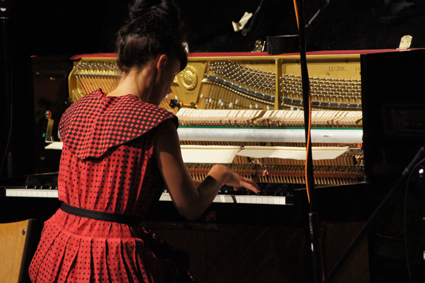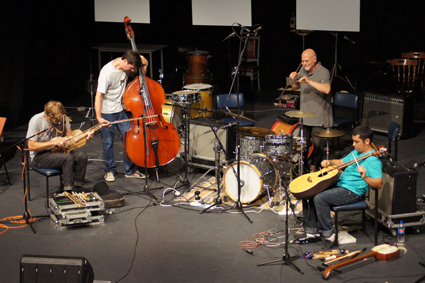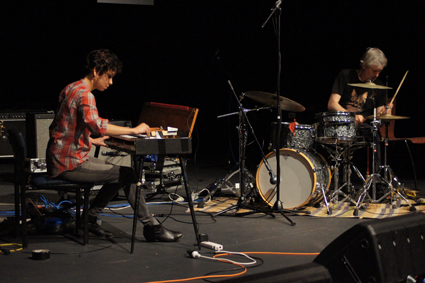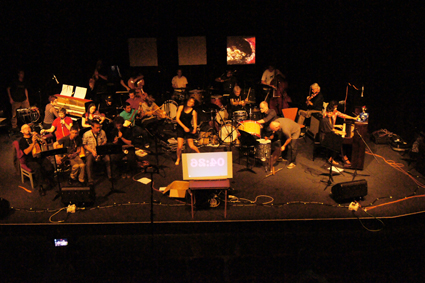unmoored in the maelstrom
dan bigna: soundout 2013

Hermione Johnson, SoundOut 2013
photo Eric Pozza
Hermione Johnson, SoundOut 2013
OPPORTUNITIES TO ATTEND FREELY IMPROVISED MUSIC EVENTS ARE FEW AND FAR BETWEEN IN CANBERRA. HOWEVER THIS SITUATION HAS IMPROVED MORE RECENTLY THANKS TO THE EFFORTS OF A SMALL YET DEDICATED SCENE COMPRISING PERFORMERS, FANS AND VENUES AND TO WHICH THE ANNUAL SOUNDOUT FESTIVAL, ORGANISED BY RICHARD JOHNSON, MAKES A SIGNIFICANT CONTRIBUTION.
For the past two years SoundOut has taken place in the intimate confines of Theatre 3 which offers a comfortable and stimulating environment with good acoustics. You can also sit in a leafy courtyard with a cold beer and interact with audience members and performers alike, which is the kind of thing that draws me to improvised music. It’s creative democracy in action; a free exchange of sounds, ideas and concepts unmoored from the trappings of past experience. The music on offer across the two days of the festival was mostly great and some of the highlights are offered here.

Abaetetuba Collective, SoundOut 2013
photo Eric Pozza
Abaetetuba Collective, SoundOut 2013
I had the loins stirred by the Brazilian Abaetetuba Collective which utilised percussion (Antonio Panda Gianfratti), double bass (Luiz Gubeissi), soprano sax (Thomas Rohrer) and the Japanese stringed instrument, the shamisen (Rodrigo Montoya). This group conjured free-form, crystallised tonalities that hit cacophonous peaks when things began to heat up.
It was great to see percussionist Tony Buck playing two Saturday sets, one with Magda Mayas, the other with Hermione Johnson, both pianists. Buck likes to decorate his kit with an assortment of objects which when struck, stroked or rubbed in the right way, produce shimmering washes of sound, metallic sparks or splintering polyrhythms. Buck is a master of his chosen instrument and in combination with two brilliant and highly energetic pianists—perhaps inspired by the wildly inventive Marilyn Crispell and Irene Schweizer—the results were multi-coloured starbursts, particularly when that whiskey kicked in.

Magda Mayas, Tony Buck, SoundOut 2013
photo Eric Pozza
Magda Mayas, Tony Buck, SoundOut 2013
Three performances in particular deserve mention for giving Canberra something unique. On the Saturday evening composer and violinist Jon Rose offered a loosely structured score for 27 performers where every instrument involved was given a starring role. I figured this was about as close as I was ever going to get to witnessing a full-blown group improvisation akin to the London Jazz Composers Orchestra. Composer/bassist Barry Guy has said about his 1989 piece Harmos for the LJCO that it was intended to expand “in all directions to encompass each player’s stylistic preferences…somehow the material implicitly embraces the musicians to a considerable degree without just constructing a line to blow on.” I’m guessing this was the intent of Jon Rose with his Composition for 27 artists.

Composition for 27 artists, Jon Rose, SoundOut 2013
photo Eric Pozza
Composition for 27 artists, Jon Rose, SoundOut 2013
Just before the piece commenced I noticed a score being handed to the performers. Rose gave some brief verbal instructions and then it began. The instruments involved were many but each was clearly defined as the piece built in intensity. More likely by intuition than design the sound seemed to take shape in a circular motion in which clusters of musicians would take the lead then pass the sound to those nearest them. The incredible thing about this semi-spontaneous composition was that the musicians involved had, in some cases, only just met their fellow performers and so were exploring a dynamic quite different from that of highly individualised technique and desire. In the end, the expanded harmonics fitted together like a puzzle and the music washed over the audience in great waves with smaller fragments darting from the stage. Indicative of a healthy creative approach to music-making, each performer worked to ensure the sounds ebbed, flowed and exploded according to feeling and loose structure. This piece comprised three parts universal consciousness and one part subtle conducting from Rose who guided a series of movements through to their logical conclusion. Combined with abstract visuals from filmmaker Louise Curham and cubist movements from Canberran dancer Alison Plevey, this performance was also magical to watch.
I had the pleasure of witnessing a performance on Sunday afternoon which featured Plevey in fluid, swinging motion that incorporated her clattering of stones as a sound source. Her supple movements provided a suitable momentum as stones were spread across the stage. With accompaniment from Reuben Ingalls on electronics, Luke Keanan-Brow on drums, Hermione Johnson on piano and Andrew Fedorovitch and Richard Johnson on sax and Annette Giesreigl on vocals, this made for a mesmerising and visceral set.
The same could be said of the raucous, roof-raising performance on Sunday afternoon featuring Jon Rose leading an ensemble made up of Rhys Butler on sax, Michael Norris on electronics, Adam Sussman on guitar, James Wapples on drums and Mike Majkowski on bass. At times the sound approached the ear-shattering levels of John Zorn’s earliest Naked City recordings and there was something very downtown New York about this intensely frenetic performance. This was a free-for-all in the true sense of the word.
Unlike the previous evening’s Composition for 27 Performers, Jon Rose melded into the performance rather than guiding it. The sonic collision within a small grouping was a welcome counterpoint to sparser moments across the weekend. It seemed that the louder and more intense the maelstrom became, the better it sounded, and when the crashing sheets of noise came to an abrupt halt I was going to quietly ask them to do it again.
SoundOut 2013, director Richard Johnson, Theatre 3, Canberra, Feb 2-3; http://soundout2013.blogspot.com.au/
This article first appeared as part of RT’s online e-dition March 13, 2013
RealTime issue #114 April-May 2013 pg. 50






